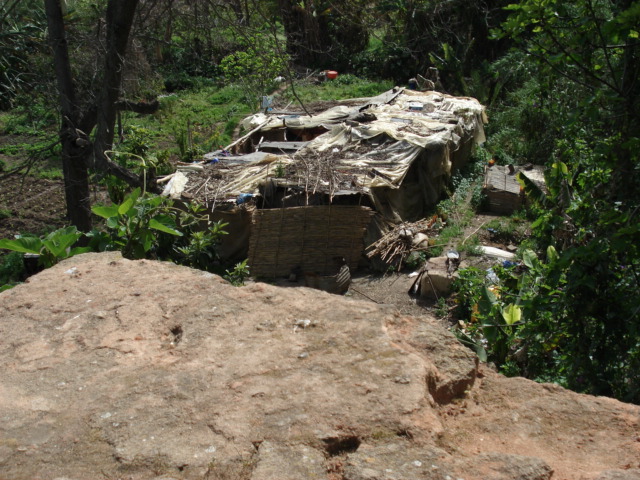A BBC article [1] about a Moroccan family living in a toilet as well as a blogger's experience with smelly bus rides (Knarf in the City: “Rush Hour [2]“) sparked a discussion about poverty in Morocco.
Cat in Rabat [3] remarked upon unpleasant smelling classes, and continued:
Having said that, the children and their clothes were, at least, superficially clean and always wore their ‘Sunday best'; in fact, they often wore the same outfit every class probably because they only owned one set of decent clothes.
Why did they smell? Many of Morocco's poor rely on a weekly trip to the hammam (public bath) to get scrubbed and scoured and splashed clean…
The blogger quoted an earlier post from The Morocco Report [4] in which the worst jobs in Morocco were discussed, naming “hammam attendant” as #1:
Imagine scrubbing the dead skin off human bodies all day long, sitting in wet clothes and sweat, pausing only for a sip of water or an orange, because for every body you scrub, you might get ten or twenty dirhams. Such is the life of a hammam worker.
Cat in Rabat transitioned into a discussion about the aforementioned BBC article…
…A family of toilet squatters who were barricaded from their ‘home’ (a home replete with a noxious zoo of various vermin and god-knows what airborne distempers) with cement and concrete. Why such draconian measures? What was their crime? – Mr. Baja had had the effrontery to go to the press seeking assistance in raising public awareness to their plight. Blocking access to the toilets was a bit of a double whammy: not only is a family now out on the street, but Mr. Baja no longer has the means to earn his bread – a living which had hitherto been less than $30.00 a month.
And Mr. Baja? – he just wants to get the hell out of Dodge. Of course, he has no money and no way of acquiring the legal means to emigrate so, instead, he's considering crossing the Straits of Gibraltar in the rusty hull of a freighter (which will probably be apprehended) or in a rickety fishing boat (which will probably capsize). He has run out of alternatives.
The Morocco Report also blogged the story, saying [5]:
Anyhow, after that there’s the poor. Not a whole lot of in-between. The poor sometimes live in the medina homes their families have owned for literally hundreds of years, usually without modern plumbing, sometimes without electricity. Other times they live in shanty towns or slums, with corrugated metal roofs held down by rocks. And then there are the homeless.
Daniel Sturgis: The Struggling Beach Buggy Travel Writer in Morocco [7] had a different take on the article:
I wouldn't put too much stock in what the “toilet guy” says. Perhaps, events in some form or another like he said might have happened. I doubt he'd pass a lie detector test on all the facts however.
First of all, what are these toilets and how did he get his job? Likely, he came off the street and worked for tips, one of countless toilet people who leave a dish for tips on a rickety wooden chair outside public toilets. Inside, the toilets always seem to remain filthy and stinking. The “toilet cleaners” don't put their “not so hard” earned money to good use and invest in a bottle of bleach every so often.
In a final comment about poverty in Morocco, I will share this poignant comment from Everything Morocco [8] posted at The Morocco Report:
Having lived in Fez medina for a long time now, I have to comment on this matter of people smelling bad or clothes not being clean – and pardon me if this gets long.
First, not all homes have water or can afford it if they do, so the family carries it to the house from the public fountain – my neighborhood is an example. Public water is free. Nor do they have washing machines (or laundromats) so all clothes are scrubbed by hand – at the public fountain. Everything is done at that fountain that can be done to stretch the family’s income.
Deodorant at 30 dh minimum per can is a whole day’s wages for an illiterate unskilled laborer. Food – or deodorant? Also, when I lived in Germany in the 80s, the buses were as rank as any here and that’s because they just didn’t want to buy a cosmetic product they considered luxurious.
Soap is cheap, yes, but again, cold water and a bucket at the public fountain – and wearing the same clothes you’ve worn all week anyway. Maybe the only clothes you own. And even if you have two sets, how much work can a woman raising a family of four, five or six kids handle anyway? And all that washing wears the clothes out faster and they may not have the money to replace them.
